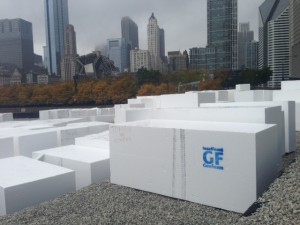For years the problem of corrosion has been on the minds of the engineers who manage the Alyeska Pipeline, a pipeline that transports oil from the fields on the North Slope of Alaska. One of the several mountain passes that connects the oil-producing areas of the North Slope with interior Alaska and the south is Atigun Pass…some of the most beautiful country on the planet; however, the harshest as well. Atigun Pass is located at an elevation of 4,739 feet above sea level and is the highest pass in Alaska that is maintained though out the year. The weather is harsh and highly unpredictable providing many challenges such as freeze thaw cycles and high concentration of seasonal moisture.
The problem was in the original design. Rigid flat stock was originally used to insulate below grade transitions of the Trans-Alaska Pipe Line. Over the years the extreme arctic conditions exposed the problem. Freeze thaw cycles and high moisture destroyed the XPS application.
EPS Goefoam was the perfect solution for this problem for both utility protection and utility insulation simultaneously. Custom cut geofoam pipe jackets were the answer with low moisture absorption, light weight for ease of installation, stable thermal protection and locally produced. Geofoam solves a decade long problem for decades to come and extending the life of the Trans-Alaksa Pipe Line one transition point at a time.
MORE:
New Below Grade Data Released: EPS vs. XPS Insulation: The EPS Industry Alliance (EPS IA) has released NEW moisture absorption data regarding XPS, moisture absorption and the effects on R-Value through the latest Technical Bulletin, EPS Below Grade Series 105: XPS Insulation Extracted After Field Exposure Confirms High Water Absorption & Diminished R-Value, March 2014 (pdf)








